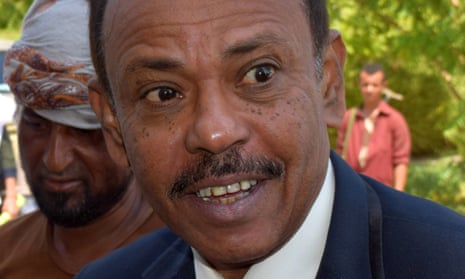Islamic State militants have claimed responsibility for the assassination of the governor of the southern port city of Aden in Yemen, one of the highest profile attacks by the terror group’s affiliate in the war-torn country.
The killing of the governor in a car bomb attack in the city, which is under the control of a coalition led by Saudi Arabia to restore the rule of the elected president, Abd Rabbu Mansour Hadi, is a stark reminder of a brutal conflict that has raged for nine months and left in its wake a security vacuum that is being filled by both al-Qaida and Isis.
“Islamic State fighters were able on Sunday morning to assassinate the governor of Aden, Maj Gen Jaafar Mohamed Saad,” a news service associated with Isis said in a statement. “[Isis] fighters had parked a car filled with explosives in the Tawahi district and detonated it as the governor’s convoy passed which led to his death along with ten of his companions.”
The attack was the most serious security breach in Aden, the country’s southern capital and Hadi’s hometown, which has been under coalition control for months and is a redoubt for pro-government forces battling to restore the president’s rule.
“It is clear that the government is internally busy fighting and the only ones working or taking over in Yemen now are Isis and al-Qaida in the Arab Peninsula (AQAP),” said Farea al-Muslimi, a Yemeni scholar at the Carnegie Middle East Center in Beirut.
A coalition led by Saudi Arabia and including an array of Sunni Arab states launched the Yemen war in March, after Iranian-backed rebels known as the Houthis overthrew Hadi’s government. The president fled house arrest to Aden and then went into exile in Saudi Arabia. The Houthi coup was seen as further evidence of Tehran’s encroachment and growing influence in the region.
The coalition established a beachhead in Aden in late July and early August, and pro-government troops backed by ground forces from the Gulf states have pressed ahead in an attempt to retake Taiz, Yemen’s third city, on the road to the capital, Sana’a.
Diplomatic efforts to end the conflict have so far borne little fruit, instead turning the conflict into a humanitarian catastrophe that has abetted the rise of extremist groups.
UN officials estimate that 80% of the Yemeni population, 20 million people, are in need of humanitarian assistance in a conflict that has battered the Arab world’s poorest country and has killed over 5,000 people.
The war has also allowed Isis, which until earlier this year had no known presence in Yemen, and AQAP, one of the most powerful branches of al-Qaida’s terror network, to gain prominence. Isis has claimed responsibility for multiple attacks in Yemen before and after the start of the conflict, particularly against Houthi targets, whereas AQAP last week took control of two Yemeni cities including Zinjibar, the capital of Abyan province.
“The assassination of Jaafar Saad underlines the failure of the Yemeni government and the Saudi-led coalition’s forces to resolve the deep power vacuum in Aden,” said Adam Baron, journalist formerly based in Yemen and visiting fellow at the European Council on Foreign Relations. “In the absence of strong, coherent efforts to bolster the city’s security, incidents like this will inevitably continue.”
The past few weeks have been marked by an escalation of attacks against humanitarian workers in Yemen. A hospital and clinic belonging to the international charity Médecins sans Frontières were bombed by the coalition in the past two months. In September, two staff members with the International Committee of the Red Cross were shot dead.
